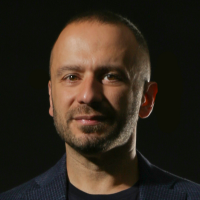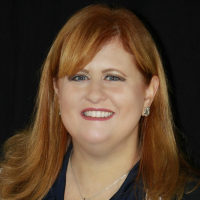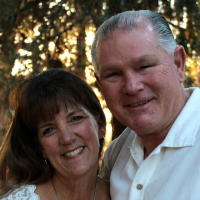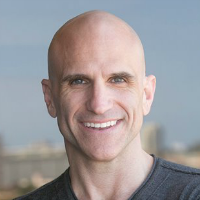The Speak Off is consistently one of the highlights of Reach Academy Live. It gives 40 speakers the opportunity to compete and get their message in front of the entire audience. The winner of the Speak Off gets a guaranteed speaking gig, but the true value comes from the process of the competition and the feedback from over 30 meeting planners who work with speakers all the time.
Here’s a video of the full Speak Off finals to give you an idea of the powerful speakers who show up to compete.
Again, what’s truly powerful and unique about this event for both the speakers and the audience is to see a bunch of different talks and then hear how different judges–all meeting planners with amazing stages or speakers themselves–respond to the different talks and unique personalities of the speakers.
At the end of the Speak Off, each judge shared their words of wisdom for the speakers as closing thoughts. There’s a lot of treasure in what they say for anyone wanting to improve their speaking career.
What to look for in this advice
Before you dive into this advice, remember that although all of these tips are great advice, some may be a better fit for you than others. You may also notice that some of the tips are similar, and the patterns you see in the advice point back to the key elements of a great talk. The more something gets repeated, the more important the idea is.
Dr. Isaac Jones, Health Experts Alliance – “Be authentic and you can move people into action.”
Authenticity is harder than you think, and in some ways it’s counterintuitive. Authenticity comes from practicing your talk and knowing your material so well that you don’t need to spend any time thinking about what your next line is. You instead focus on bringing your unique personality to the stage and your story to life.
Dave Woodward, Funnel Hacker – “Do not be afraid to convey your true emotions so the audience can feel what you felt.“
Emotion is the key to creating a human connection with your audience. Without that true connection, what you say or do may come off as “salesy,” “hype,” or “boring”. Diving into the emotions you felt in the stories you share–and being courageous and vulnerable enough to share them–is the key to building that connection.
 Giovanni Marsico, Archangel – “Let go of the rehearsed part and your audience will connect with you more.”
Giovanni Marsico, Archangel – “Let go of the rehearsed part and your audience will connect with you more.”
Truly knowing and mastering your talk means that you are comfortable enough to go off script without completely derailing your talk. Every audience and event is unique and will provide you with unique opportunities to connect with the audience in an authentic way. If you cling to your script, you may miss these opportunities.
 Connor Beaton, Man Talks – “Less theatrics & more conversation. When audience feels that you are having a conversation with them, that’s when you are winning.”
Connor Beaton, Man Talks – “Less theatrics & more conversation. When audience feels that you are having a conversation with them, that’s when you are winning.”
It’s important that your talk is entertaining and engaging to keep the attention of your audience. A good talk creates a sense in the audience like they’re just sitting one on one with you in a coffee shop and you’re conveying your advice and story just for them. Bringing this conversational feel and relaxed energy into your talk can help your big points connect.
 Tiffany Swineheart Hal Elrod – “Rather than trying to be understood, try to make the audience feel that you understand them.”
Tiffany Swineheart Hal Elrod – “Rather than trying to be understood, try to make the audience feel that you understand them.”
Remember that the goal of storytelling is to help your audience know that you’ve been in their shoes and you understand the problems they’re facing. Do your homework on your audience and make sure you construct your talk in a way that speaks right to the problems they’re facing.
 Heather Cazad, Character.org – “Know your audience and teach them something they needed to know that they didn’t think they needed to know.”
Heather Cazad, Character.org – “Know your audience and teach them something they needed to know that they didn’t think they needed to know.”
From the first second you step onto the stage, your audience is looking at you and wondering if they’re going to get something valuable out of their presentation, or if this time would be better spent checking their email. The way to capture the attention of the audience is to understand them so well that you can teach them something that shifts their paradigm and opens them up to new ideas they never knew they needed.
 Angela Phillips, Ontraport – “Own your story and take control of the story that you have.”
Angela Phillips, Ontraport – “Own your story and take control of the story that you have.”
If you’ve watched some of the talks from the Speak Off in the video above, you’ll see some very powerful stories. You may think that you need to have overcome tremendous pain or achieved a spectacular goal to be a successful speaker, but that’s not the case. Take your focus off of other speakers and own your own story–don’t let comparison slow you down.
 Anthony Trucks, Trust Your Hustle – “You’re going to venture into an unknown that is scary and intimidating. The fears of failure will slow you down. What you also have to realize is that inside of that same unknown is all the amazing success you can experience.”
Anthony Trucks, Trust Your Hustle – “You’re going to venture into an unknown that is scary and intimidating. The fears of failure will slow you down. What you also have to realize is that inside of that same unknown is all the amazing success you can experience.”
Being a speaker, an entrepreneur or anyone with a message is an adventure. There’s going to be many uncertain moments you must confront and fear you must overcome. Trust yourself in those moments and don’t let the fear slow you down. Take risks and get back into the arena.
 Marc Gutman, Entrepreneur’s Organization – “Relive your story, don’t just retell it.”
Marc Gutman, Entrepreneur’s Organization – “Relive your story, don’t just retell it.”
Your talk should take us into your story with you. As you tell it, your audience should experience it in the present moment. Talk in present tense, share little details like smells, sounds, tastes, and feelings so they can immerse themselves in the moment with you.
 Chandler Bolt, Self-Publishing School – “Have a central idea for what you are saying and tie it back to every idea and point in your talk.”
Chandler Bolt, Self-Publishing School – “Have a central idea for what you are saying and tie it back to every idea and point in your talk.”
A good talk is built around an idea that is simple enough to be summed up in one sentence. When you have that level of clarity and focus in your talk, it allows you to loosen up what you are doing because you can always go back to the main point. It keeps you from getting lost in your own talk and lets you focus more energy on connecting with your audience.
 Margaret Noroian, CADA – “Be real, be honest, be vulnerable. Don’t be afraid to be the same person on and off the stage.”
Margaret Noroian, CADA – “Be real, be honest, be vulnerable. Don’t be afraid to be the same person on and off the stage.”
A great talk will bring out the best in you and will ensure that you’re the same person whether you’re on the stage or not. Having the courage to be vulnerable and show your true self in your talk is the key to building a human connection with your audience.
 Allison Gadeke, CADA – “Deliver with passion.”
Allison Gadeke, CADA – “Deliver with passion.”
Your passion is contagious and it feeds the key emotions your audience needs to take action. Make sure you deliver the key points in your talk with passion and that there’s no doubt in your audience’s mind when you are delivering the best ideas in your presentation.
 Heather DeSantis, The Influencer Revolution – “Make sure your message is relevant and timely to what’s happening in the audience’s world right now.”
Heather DeSantis, The Influencer Revolution – “Make sure your message is relevant and timely to what’s happening in the audience’s world right now.”
A few weeks before the Speak Off, there was a social media frenzy around the #metoo campaign. This was a powerful message for many women and men. A few speakers referenced the campaign in their talks and connected their story with it. This timeliness and relevance helped their messages hit home.
 Karl Krummenacher, Mindshare Summit – “Keep your stories congruent and try not to do too much.”
Karl Krummenacher, Mindshare Summit – “Keep your stories congruent and try not to do too much.”
Your story should be simple and make sense without any effort from your audience. Usually this means keeping it simple and just focusing on one key idea throughout your presentation. Make sure your talk is aligned with your audience by personalizing your story to the unique needs of your audience.
 Don Shaffer, CADA – “Care about your clients and become a partner with your audience.”
Don Shaffer, CADA – “Care about your clients and become a partner with your audience.”
One of the core goals of your talk should be to clearly illustrate why you care about your audience. The elements of your story should leave your audience without a doubt that you care about them and the problems they’re facing, and that you’re on their team.
 Houston Kraft – “Share the story as you see it in your head and not how you see the notes in your head.“
Houston Kraft – “Share the story as you see it in your head and not how you see the notes in your head.“
What sounds good in writing is not always what sounds good spoken out loud. Make sure you practice your story so that you can create the sense of being right in the action as you tell it.
 Angelique Rewers, The Corporate Agent – “Make sure your message is marketable and memorable.”
Angelique Rewers, The Corporate Agent – “Make sure your message is marketable and memorable.”
A marketable message will get stuck in your head like a hit song on the radio. By keeping your message simple and tying it back to all of the ideas in your presentation, it will make it easier to remember and share.
 Julie May, Shine Events – “Your audience needs to know what your message means for them. You’ve gone through a transformation in your story, but what does that look like for them?”
Julie May, Shine Events – “Your audience needs to know what your message means for them. You’ve gone through a transformation in your story, but what does that look like for them?”
A key challenge to overcome is to make your story relatable so that it not only resonates with your audience, but they can come away with meaningful information to apply to their own lives. Your story shows how you’ve grown and what you’ve learned, but does your audience need to do the same? Make sure you have a clear call to action that helps them take your story home with them.
 Julie Davis, eWomen Network – “Come from a place of how are you serving your audience. It’s not about the speaker but about the listener and what the audience is gaining from the speaker and the story and what the listener can do with it.”
Julie Davis, eWomen Network – “Come from a place of how are you serving your audience. It’s not about the speaker but about the listener and what the audience is gaining from the speaker and the story and what the listener can do with it.”
Giving a great presentation is more than just telling a riveting story. You need to make sure that the story you share provides something useful for your audience. Break down your key lessons, takeaways and calls to action in a clear way that helps your audience take action on the ideas you share.
 Aaron Street, Lawyerist Podcast – “Be purposeful in your body language.”
Aaron Street, Lawyerist Podcast – “Be purposeful in your body language.”
All of your movement on stage should serve a purpose. Whether you’re moving upstage, downstage, making gestures or leaning in, your movement should help drive your points home. Any movement that does not have purpose is distracting.
 Brad Johnson, The Elite Advisor Blueprint®: The Podcast for World-Class Financial Advisors – “Quiz or consult your audience before you go up on stage.”
Brad Johnson, The Elite Advisor Blueprint®: The Podcast for World-Class Financial Advisors – “Quiz or consult your audience before you go up on stage.”
Your presentation begins long before you take the stage. You can spend time in the weeks before you speak talking to the audience or the meeting planners that represent them to identify their most pressing needs and tailor your presentation to perfectly fit them.
 Jon Block, Speaker Venture – “Follow the 3H rule: Head, Heart, Humor.”
Jon Block, Speaker Venture – “Follow the 3H rule: Head, Heart, Humor.”
Head, heart, and humor are all key ingredients to a good talk. With only “head,” your talk is informative but boring; with “heart,” your talk is inspirational but the feeling fades quickly; and “humor” alone does not work either. By combining all three, you can have a talk that’s memorable and helpful and employs humor to help contrast the powerful emotions of your story.
 Keith Yackey, Amplify Live – “Keep practicing.”
Keith Yackey, Amplify Live – “Keep practicing.”
The only way you’re going to improve your talk and your speaking skills is by staying in the arena and getting in front of more people. Take risks, make mistakes and always be looking for new ways to improve your talk.
 Dush Ramachandran, The Net Momentum – “Interact with the audience and engage them in the conversation. Invite them in, rather than talking at them.”
Dush Ramachandran, The Net Momentum – “Interact with the audience and engage them in the conversation. Invite them in, rather than talking at them.”
Staring into the bright lights from the stage can make it easy to forget you’ve got an audience in front of you. Do your best to keep your audience engaged in your talk, respond to their reactions, and involve them in the conversation that’s happening. Interaction helps your audience connect with you on a deeper level.
 Terra Ramachandran, The Net Momentum – “Make your close as strong as your opening.”
Terra Ramachandran, The Net Momentum – “Make your close as strong as your opening.”
The very beginning and end of your talk are essential to perfect. A good opening will grab their attention, and a good close is essential to get your audience to take action. Many can get the opening right, but you’ll be a true master if you can close your talk with the same power.
 Michael Port, Heroic Public Speaking – “Don’t get too bogged down in feedback.”
Michael Port, Heroic Public Speaking – “Don’t get too bogged down in feedback.”
As someone who is getting up on stage and in front of many people, you’ll get lots of feedback from lots of different people. It’s important to consider feedback and use it to improve your talk, but don’t attach too tightly to any single piece of feedback and let it slow you down. Carry out your vision and message in the way that feels best to you.
 Amy Port, Heroic Public Speaking – “Where you shine is in what makes you different.”
Amy Port, Heroic Public Speaking – “Where you shine is in what makes you different.”
It can be difficult to watch something like the Speak Off and not try to cram every single idea and piece of feedback into your presentation. But it’s not always the best fit for you. Make sure you understand what makes you different and what separates you from the pack, and never compromise it.
 Phil Mershon, Social Media Examiner – “Build a bridge from your story and passion to your audience. Make your content as memorable as your story.”
Phil Mershon, Social Media Examiner – “Build a bridge from your story and passion to your audience. Make your content as memorable as your story.”
A great talk does not just have a memorable story–it needs to have memorable content that will stick with your audience long after your talk. You need a strong understanding of your audience to make sure your content connects with them in the way they need.
 Tom Schwab, Interview Valet – “It’s not only about learning how to be a speaker, but how to be an amazing speaker.”
Tom Schwab, Interview Valet – “It’s not only about learning how to be a speaker, but how to be an amazing speaker.”
You can learn all the tactics and strategies for being a great speaker in the world, but the process of becoming an amazing speaker involves more than that. It’s a process and a journey that will change your life in many ways. It requires facing your past, your pain and your fears and turning that into something powerful that you can share.
 Taki Moore, Black Belt Marketing – “Be real.”
Taki Moore, Black Belt Marketing – “Be real.”
Authenticity is a challenging thing. It’s not the same as technique, and it’s not a tactic. If you can be real and authentic, your audience will recognize it. Being real comes from talking about something that’s important to you and having the vulnerability to really show yourself to your audience, which can sometimes be scary, but it’s well worth it in the end.
Conclusion
The Speak Off is an incredible resource because you get to see so many different styles, stories and feedback in a short period of time. It can be easy to get overwhelmed if you try to apply all of the ideas and suggestions to your talk at the same time. Carefully consider the feedback you hear, and experiment with the different tips to find what fits for you.



 Giovanni Marsico,
Giovanni Marsico,  Connor Beaton,
Connor Beaton,  Tiffany Swineheart
Tiffany Swineheart  Heather Cazad,
Heather Cazad,  Angela Phillips,
Angela Phillips,  Anthony Trucks,
Anthony Trucks,  Marc Gutman,
Marc Gutman,  Chandler Bolt,
Chandler Bolt,  Margaret Noroian,
Margaret Noroian,  Allison Gadeke,
Allison Gadeke, Heather DeSantis,
Heather DeSantis,  Karl Krummenacher,
Karl Krummenacher,  Don Shaffer,
Don Shaffer,  Houston Kraft
Houston Kraft Angelique Rewers,
Angelique Rewers,  Julie May,
Julie May,  Julie Davis,
Julie Davis,  Aaron Street,
Aaron Street,  Brad Johnson,
Brad Johnson,  Jon Block,
Jon Block,  Keith Yackey,
Keith Yackey,  Dush Ramachandran,
Dush Ramachandran,  Terra Ramachandran,
Terra Ramachandran,  Michael Port,
Michael Port,  Amy Port,
Amy Port,  Phil Mershon,
Phil Mershon,  Tom Schwab,
Tom Schwab,  Taki Moore,
Taki Moore, 



